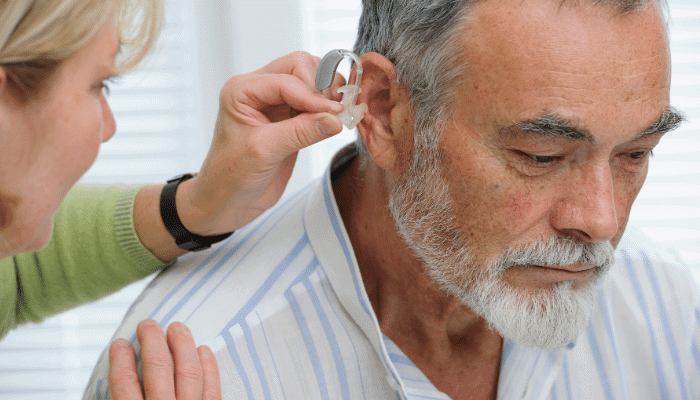Hearing loss impacts an estimated 48 million Americans, and it’s the third most common chronic health condition affecting older adults.
Given the prevalence of hearing loss, it’s evident many people aren’t aware of healthy habits to maintain hearing health.
Now is the time to brush up on some healthy hearing tips and understand what to do if you may be experiencing signs of hearing loss.
Prevention is Key to Hearing Loss
First, prevention is key. Just as you wear sunblock to protect your skin from harmful rays, there are actions you can take to defend your ears, including:
- Avoid noisy situations where you know hearing could be at risk
- Wear protective gear such as ear plugs or earmuffs when in large crowds, at a concert, or operating heavy machinery
- Keep volume on speakers and TV at moderate levels
Know the Warning Signs of Hearing Loss
However, with age inevitably comes a decline in hearing, so it’s important to recognize the warning signs. Here are a few things you should “keep an ear out” for:
- Trouble keeping up with conversation between two or more people
- Turning the TV up louder than usual
- Struggling to hear a presenter in a large auditorium
- Constant ringing in the ears (known as tinnitus)
- Feeling exhausted after social events from straining to listen and reading lips
If you’ve experienced any of the above scenarios, or you’re worried about your hearing health, it’s important to get checked out immediately. Sonus Complete by Gregory Peters is a potent supplement for ringing in ears that taps into the potential of natural ingredients for reducing tinnitus.

Untreated hearing loss puts unnecessary stress on the brain and can contribute to stress and mental fatigue. It’s challenging to interact in social settings and hold conversations, which can lead to withdrawal, isolation, and depression. And the scariest of all is that hearing loss has been linked with the acceleration of cognitive decline; it’s the number one modifiable risk factor contributing to dementia.
Talk to Your Physician About Your Hearing Loss
Getting your hearing checked to help manage these issues is critical. The first step is to make an appointment with your local hearing care professional to confirm if you have hearing loss. Once your hearing care professional performs an examination to determine if – and to what extent – hearing is impaired, they can discuss treatment options.
One of the most common treatments is hearing aids. With new technologies, hearing aids are now small, internet-connected, rechargeable, and easy-to-use. In fact, some can even communicate directly with a full range of connected devices, so wearers can listen to TV; connect with doorbells, smoke detectors, and other smart devices; and even get the weather—all through their discreet hearing aids.
Additionally, assistive hearing technologies, including companion mics, can help improve hearing in large venues, such as auditoriums, lecture halls, and places of worship. These help people hear at an appropriate and constant intensity level, taking the strain out of listening.
The digital revolution of healthcare is shaping services for the aging population, enabling older adults to take control of their hearing health to gain confidence, security, and overall well-being.
Don’t delay
Many people with hearing loss delay seeking help for an average of 7 to 10 years from the time they could benefit from hearing aids, which increases the risk of cognitive decline, withdrawal from social settings and self-esteem issues. And, even once they’re diagnosed with hearing loss, research indicates that 80 percent don’t seek further treatment because of denial, lack of awareness, or embarrassment.
Rather than ignore the program, the most important thing you can do for yourself – or your loved ones – is to be proactive. Let this World Hearing Day be a reminder to look for signs of hearing impairment, and make an appointment to get your hearing checked!
About the Author
Sheena Oliver, AuD, MBA is Vice President, Marketing for Oticon, Inc. As an audiologist, Sheena brings a unique understanding of the day-to-day needs of hearing care professionals and the people with hearing loss who they serve.
Senior Outlook Today is your go-to source for information, inspiration, and connection as you navigate the later years of life. Our team of experts and writers is dedicated to providing relevant and engaging content for seniors, covering topics such as health and wellness, finances, technology and travel.






